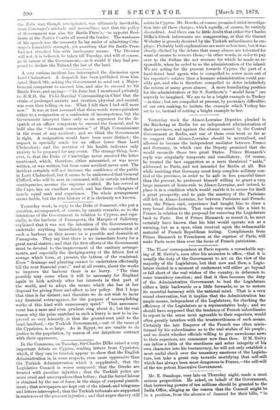In the Commons, on Tuesday, Sir Charles Mike raised a
very important debate on Cyprus, reading letters from Cypriotes, which, if they can be trusted, appear to show that the English Administration is, in some respects, even more oppressive than the Turkish Administration which it supplanted; that the Legislative Council is worse composed; that the Greeks are treated with peculiar injustice ; that the Turkish police are more cruel and unscrupulous than before; that the forced labour is obtained by the use of force, in the shape of corporal punish- ment; that newspapers are kept out of the island, and telegrams and letters intercepted; that the Turkish tribunals are supported in sentences of the grossest injustice ; and that negro slavery still exists in Cyprus. Mr. Bourke, of course, promised strict investiga- tion into all these charges, which equally, of course, he entirely discredited. And there can be little doubt that either Sir Charles Dilke's Greek informants are exaggerating, or that Sir Garnet Wolseley is grossly deceived by the Turkish subordinates he em- ploys. Probably both explanations are more or less true, but it was clearly elicited by the debate that many abuses are tolerated for want of means to remove them,—in other words, in order to pay over to the Sultan the net revenue for which he made us re- sponsible, when he ceded to us the administration of the island. We are acting for the present towards Cyprus the part of a hard-fisted land agent, who is compelled to screw more out of his superior's estates than a humane administration could pos- sibly get, and who is therefore compelled to defer indefinitely the reform of many gross abuses. A more humiliating position for the administrators of Sir S. Northcote's "model farm" can scarcely be imagined. We are to be a bright example to Turkey —in time ; but are compelled at present, by pecuniary difficulties of our own making, to imitate the example which Turkey has set to us, instead of setting a bright example to her.


































 Previous page
Previous page